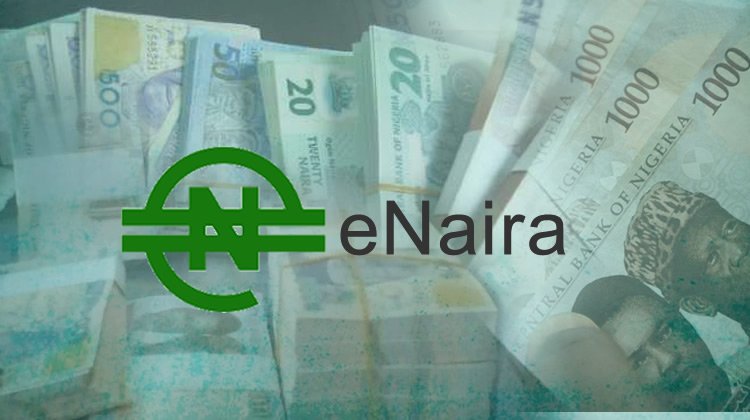over N500m currency minted, 33 banks fully integrated
By Dele Ojo
President Muhammed Buhari has launched Nigeria’s newly created digital currency, the eNaira, Monday in Abuja, Nigeria. The eNaira was scheduled to be launched on October 1, 2021, but was moved due to a lots of activities billed for Nigeria’s 61st-anniversary celebrations.
The launch was described by CBN Governor, Godwin Emefiele, as the first in Africa and one of the earliest around the world. Emefiele said, “Mr. President, today you make history, yet again, with the launch of the eNaira – the first in Africa and one of the earliest around the world.”
According to Central Bank, the eNaira is the digital form of the Naira, issued by the CBN, and direct liability of the Bank, a legal tender and would form part of the currency-in-circulation and at par with the physical Naira. The eNaira shall complement traditional Naira as a less costly, more efficient, generally acceptable, safe and trusted means of payment. In addition, it will improve monetary policy effectiveness, enhance government’s capacity to deploy targeted social interventions and boost remittances through formal channels.
At the launch, Godwin Emefiele, revealed that the Central Bank Digital Currency (CBDC) eNaira has taken off with over N500m of the currency minted so far while 33 banks have been fully integrated and live on the platform.
Currently, Emefiele disclosed that over 2.5 million people visit the website daily and N200 million has been issued to financial institutions.
“Over 2,000 customers have been onboarded and 120 merchants have successfully registered on the eNaira platform, Emefiele ststated.
For prospective users, the eNaira wallet is required to access, use and hold eNaira. The eNaira will be exchangeable for other Central Bank Digital Currencies (CBDC).
In the guidelines released for clarification on the innovation, the Apex Bank explained that the eNaira shall be administered by the CBN through the Digital Currency Management System (DCMS) to mint and issue eNaira, while Financial institutions shall maintain a treasury eNaira wallet for holding and managing eNaira on the DCMS.
The Financial Institution Suite is the primary application used by the financial institutions to manage their digital currency holdings, requests, and redemption with the CBN.
However, the eNaira stock wallet belongs solely to the CBN and it shall warehouse all minted eNaira.
The guidelines stipulate that financial institution may create eNaira sub-treasury wallets for branches tied to it and fund them from its single eNaira treasury wallet with the CBN.
It noted that CBN shall exclusively perform the following roles:
- a) Mint, issue, distribute, redeem and destroy the eNaira;
- b) Determine the technical, regulatory and operational standards for the eNaira;
- c) Manage unresolved eNaira issues and complaints escalated from the FIs and disputes arising between FIs;
- d) Monitor compliance with applicable regulations; and
- e) Issue directives and review Guidelines on eNaira periodically as may be required.
As intermediaries, financial institutions roles within the eNaira ecosystem shall include:
- Facilitating eNaira speed wallet onboarding for bank customers (merchants and individuals) including sensitizing them on the need to familiarize themselves with details of their BVN particulars, especially email address. This is a major requirement for the self-service enrollment process into the eNaira Speed App.
- Integrating the eNaira speed wallet feature into their electronic banking channels;
- Requesting eNaira from CBN for self and on behalf of its customers;
- Managing eNaira across its branches;
- Developing and/or updating reports and internal frameworks to ensure compliance with KYC and AML/CFT requirements;
- Receiving and resolving customers’ complaints on eNaira (including prompt update of customers’ BVN particulars in NIBSS); and
- Ensuring that eNaira enquiries and complaints are included in the periodic reports to CBN.
According to Central Bank, Consumers are the end users of the eNaira and their roles are as follows:
1) Creating eNaira speed wallets and funding it;
2) Utilising eNaira as an alternative payment option for legitimate transactions;
3) Protecting their eNaira speed wallet access credentials; and
4) Notifying financial institutions in the event of fraud/complaints/disputes.
In August, Godwin Emefiele, announced the formal engagement of the global Fintech company, Bitt Inc., as the technical partner for its digital currency, and listed the benefits of the Central Bank Digital Currency (CBDC) to include increased cross-border trade, accelerated financial inclusion, cheaper and faster remittance inflows, easier targeted social interventions, as well as improvements in monetary policy effectiveness, payment systems efficiency, and tax collection.
Project Giant, as the Nigerian CBDC pilot is known, has been a long and thorough process for the CBN, with the Bank’s decision to digitize the Naira in 2017, following extensive research and explorations. Given the significant explosion in the use of digital payments and the rise in the digital economy, the CBN’s decision follows an unmistakable global trend in which over 85 percent of Central Banks are now considering adopting digital currencies in their countries, the Bank explained.
According to Emefiele, the CBN’s selection of Bitt Inc, from among highly competitive bidders, was hinged on the company’s technological competence, efficiency, platform security, interoperability, and implementation experience.







Comment
No comments found.